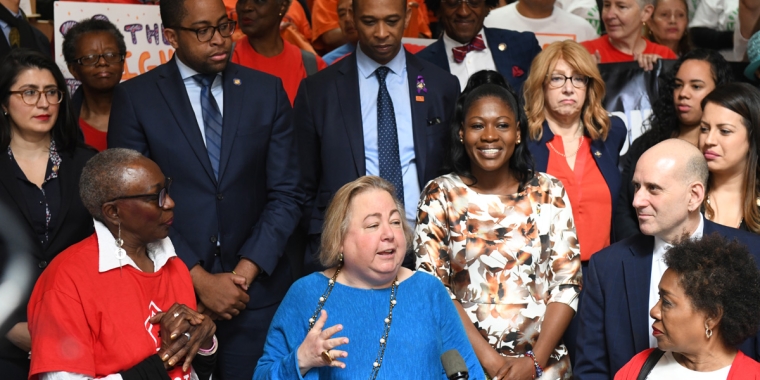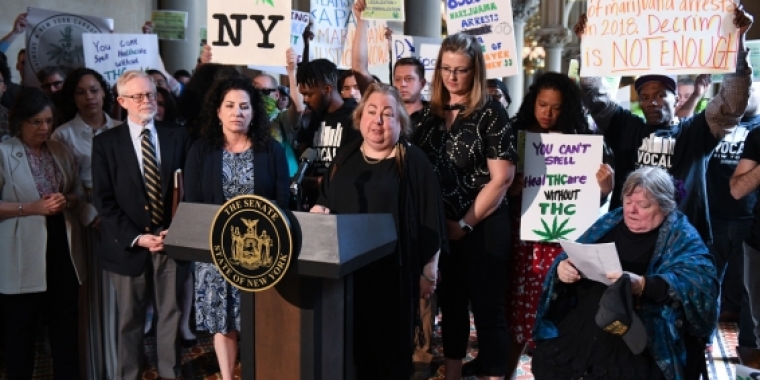
Statement From Senator Liz Krueger On Reforming The New York City Board Of Elections
June 30, 2021

New York City - State Senator Liz Krueger released the following statement today regarding the ongoing failure of the New York City Board of Elections to reliably administer elections:
“Yesterday's fiasco over preliminary ranked choice voting results is one more demonstration - as if we needed it - of why there must be significant reform of the NYC Board of Elections. The number of screw-ups at every level of management that must have gone into the release of those incorrect numbers is mind boggling.
"We all know the fundamental reason for this ongoing incompetence - although there are noteworthy exceptions, the bulk of the BOE is staffed through political patronage rather than qualifications. My bill with Assm. Rozic would professionalize this vital civic body by requiring commissioners to have relevant qualifications, and create new co-executive directors with clearly delineated powers and responsibilities.
"It is absurd for New York City to continue down this path election after election. It's time to enact the reforms we all know are so desperately needed to give New Yorkers full confidence in their elections."
###
Background on S.6226-A/A.5691-B (Krueger/Rozic)
In December of 2020, the Legislature held a roundtable on how to make the New York City Board of Elections more efficient and accountable to the people of New York City. A major theme of the day was a need to delineate responsibilities, increase training, and to create a process where employees of the board are capable of completing their responsibilities and accountable for their work.
S.6226 provides for clear delineation of the various responsibilities of the commissioners of the board of elections, and provides for clear powers, responsibilities, and duties for the co-executive directors. The bill develops a methodology where the co-executive directors can be held accountable through processes designed to remove and appoint co-execuive directors. Most importantly, the bill creates various training and continuing education requirements for commissioners, co-executive directors, and staff so that all employees and managers have the skills needed to administer elections in the City efficiently, accurately, and that the voting rights of New Yorkers are protected.
Summary of Specific Provisions:
Section one of the bill amends section 3-200 of the Election Law to require the State Board of Elections to prescribe certain qualifications that shall apply to the commissioners of election of the board of elections for the city of New York. These qualifications would ensure that commissioners have the skills and knowledge to exercise the responsibilities and duties of their position. Commissioners at the board of elections of the city of New York would be required to complete trainings conducted by the state board within 60 days after they commence their duties.
Section two of the bill amends section 3-212 of the Election Law to require additional budgetary responsibility at the board of elections. The director of the management and budget would be required to notify the co-executive directors, the mayor, the speaker of the city council, and the public advocate if it is expected that the city board of elections would exceed its appropriation. The co-executive directors of such board would be responsible for responding to such director a projection of the amount that they will exceed their appropriation, and relevant information justifying such excess expenditures.
Section three of the bill adds new subdivisions to section 3-300 of the election law delineating the powers and duties of the co-executive directors of the city board of elections, and the board of elections of the city of New York (The board). The board will be responsible for promulgating regulations, issuing orders and making decisions regarding general policies affecting the administration of elections of the city of New York. The bill expressly reserves certain powers and functions for the board, including but not limited to the designation of election districts and poll sites, approving procurement contracts valued at greater than one million dollars, choosing voting machines and systems, canvassing election results, making determinations regarding the nomi- nation and designation of candidates, and, the form and content of ballots and challenges to voter registration.
The co-executive directors, which must be of separate political party affiliation, would now be appointed by a majority vote of the mayor of the city of New York, the speaker of the city council and the public advocate, with the provision that the Mayor must be part of the majori- ty. The co-executive directors would be chosen for appointment from a list developed by the commissioners of election representing each political party. The co-executive directors would have the same powers and
duties delegated to local boards of elections under the Election Law, including but not limited to the appointment, salaries and removal of all staff, such as poll workers, inspectors and voter machine technicians and all matters relating to voter registration and enrollment, cancellation of voter registration, policies providing for appropriate ongoing training of employees, policies establishing employee evaluations, change of voter status and registration records, except where such powers are expressly reserved for the board. The co-executive directors must exercise their powers in a manner not inconsistent with the policies established by the Board.
Section four amends section 4-136 of the election law to include the purchase of goods, services, and technology to the list of items for which the city board of elections can procure from the city. The board shall comply with the rules and regulations of the city procurement policy board and applicable state law.
Section five allows the current executive director and deputy executive director to assume the roles of co-executive directors until the commissioners complete the required process for appointing co-executive directors.
Section six provides that the bill shall take effect sixty days after enactment.
related legislation
Share this Article or Press Release
Newsroom
Go to Newsroom

Senator Krueger's Community Bulletin - June 2019
June 11, 2019

Senator Krueger's Anti-Scam Newsletter - Spring 2019
June 10, 2019